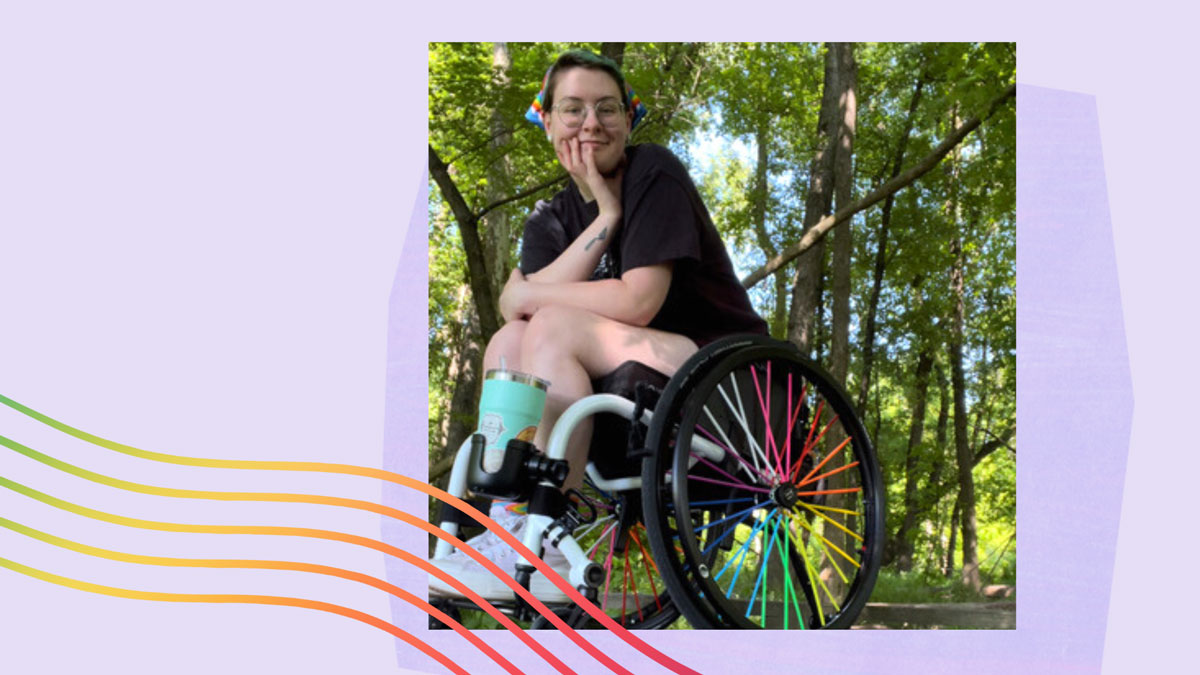By Em Kase | @gremlingrandparent
As an autistic, disabled, and queer person, the intersection of Pride and accessibility impacts my life in so many different ways. I came out as queer back in 2014, so I had a few years of experience with Pride events before I became physically disabled in 2020. Going to Pride as an able-bodied, newly out queer person was one of the most joyful and impactful moments of my queer journey. I met so many incredible people from so many different backgrounds and intersectional identities. But the one marginalized group that I rarely saw at these Pride events were disabled people. Although, at the time, I don’t think I was consciously aware of the absence of the queer disabled community. After all, I was still able-bodied back then and was socialized in a society that doesn’t really talk about disabled people in any setting, let alone at Pride events. So, I had all my rainbow paraphernalia in hand and I celebrated my time with the queer community to the fullest extent.
Fast forward 6 years, and we’re in the beginnings of a global pandemic, battling a virus that is disproportionately killing disabled and chronically ill people. There was no Pride event to be had in 2020 – for anyone. September 2020 arrives, and I started experiencing multiple neurological and musculoskeletal symptoms: dislocations of my joints, chronic pain, high heart rate and symptoms of pre-syncope; as well as chronic muscle spasms and brain fog. I see at least a dozen different specialists, and no one has any answers for me. “It’s just anxiety.” “You’re so young, it’s probably just growing pains.” “All your bloodwork is normal, so it must be all in your head.” I started using forearm crutches to help me walk so I didn’t fall, or put too much pressure on the joints in my legs and cause dislocations. 2021 rolls around, and I finally have some answers, as I’m diagnosed with postural orthostatic tachycardia syndrome (POTS), mast cell activation syndrome (MCAS), and later in the year, Ehlers Danlos Syndrome (EDS).
Cases of SARS-Covid 2 start to decrease as we’re emerging from a winter of increased infection, hospitalization, and death. It looks like Pride events are finally happening again! But as I’m looking at all the dates and locations for these events from my newly disabled perspective, I realize that none of these venues and events are accessible. Pre-Pride bar crawls are at bars with stairs that I can’t safely climb without my heart rate spiking, drag brunches are in restaurants without accessible entrances on the days I might need to use my wheelchair, and all the main Pride events are on grassy hills, or inaccessible streets, all without access to accessible toilets or disability informed first aid. And worst of all, none of these events are requiring masks. As a newly disabled and high-risk individual, seeing all the able-bodied queer friends I had walking around these events unmasked, possibly transmitting a virus that was disproportionately killing people like me, was simultaneously heartbreaking and infuriating. For a community that touts slogans of “all are welcome” and “the future is intersectional”, the complete disregard for disabled and chronically ill queer people was, and still is, an act of everyday ableism.
I want to be able to join my fellow queer friends at Pride. I want to be able to have fun and support local queer artists and vendors. I want to be able to feel safe in my queer community. And as an able-bodied person, I was able to have all those things. Becoming disabled during a global pandemic, in which so many non-disabled people have shown their blatant disregard for disabled life, was terrifying. But I was still hopeful that maybe I’d be able to safely connect with my community this June, after the two years of everyone seeing what this virus does, especially to people like me. I have been nothing but disappointed. Venues are still physically inaccessible, with stairs and non-ADA compliant inclines, no shaded areas for people who have heat intolerance, and only one or zero accessible bathrooms. And none of the events are requiring masks. All of these things combined show me, and the rest of the queer disabled community, that we are not welcome. We are not safe here. We are an afterthought.
At Joshin, we are deeply committed to amplifying voices like Em Kase’s, who bring to light the critical intersection of Pride, accessibility, and disability. Em’s experience underscores the urgent need for more inclusive and accessible spaces, especially within communities that already face marginalization. The queer community’s slogans of “all are welcome” and “the future is intersectional” must extend to include those who are disabled and chronically ill. Em’s journey from an able-bodied participant in Pride events to navigating these spaces with a disability offers a poignant look at the everyday ableism that still exists, even within communities built on the idea of inclusion. We believe that true liberation and inclusion must account for all intersectional identities, and that starts with making events and spaces accessible for everyone. At Joshin, we’re not just talking about these issues; we’re actively working to create solutions that make life more equitable for disabled and neurodivergent individuals.
If your Pride events are inaccessible, they are performative, and not about queer liberation. Access is the minimum. If Pride is not for all of us, it is merely just a party for those with privilege.
